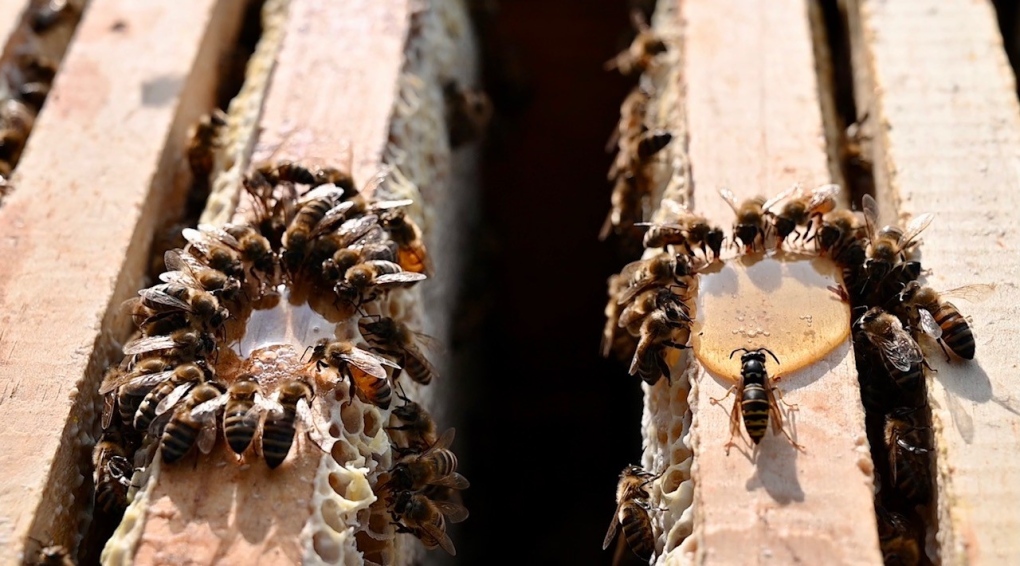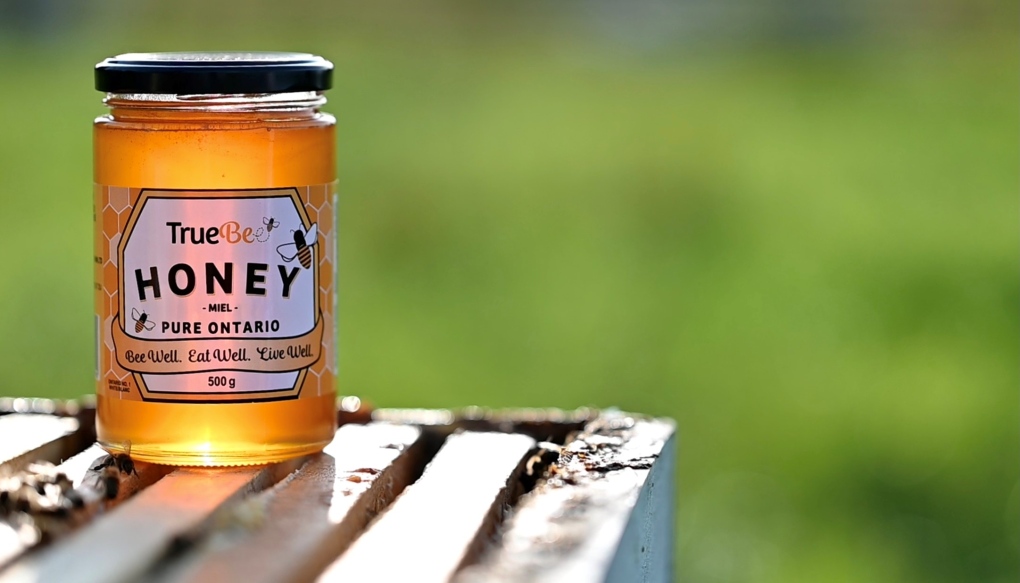TrueBee Honey: A Sweet family business in St. Andrews West
Emily Briffa never dreamed she would be spending her life in the company of bees and their hives.
"This started when I met Jan, the bee keeper. We were actually neighbours," said Briffa.
"He loved the bees. I fell in love with the man, and then I fell in love with the bees," she laughed.
Jan Peachey, now Briffa’s husband and the father of their three children, started bee keeping in 1995 with just a handful of hives.
"I enjoyed it so much that I made a career out of it," said Peachey.
The honey harvest is in full swing at the Peachey Honey Farm, producers of a variety of TrueBee Honey.
"We specialize in raw, unpasteurized, small-batch, artisanal honey products," said Briffa.
And Briffa admits to being very sweet on the honey business. Every day, she’s in awe of her industrious bees.
 The bees at Peachey Honey Farms. (Joel Haslam/CTV News Ottawa)
The bees at Peachey Honey Farms. (Joel Haslam/CTV News Ottawa)
"It’s just a really magical thing. It’s a really dynamic, beautiful working relationship between man, woman, and honey bee," she said.
"A bee will have to travel about 60,000 miles to make one pound of honey. That’s a lot of buzzing around," she smiles.
The family has some 500 hives across South Stormont. They are strategically placed in a variety of bee yards spanning 100 kilometres.
"You can’t put all of your bees in one spot. There wouldn’t be enough flowers for the bees," said Peachey.
"So, you spread the bee hives throughout the countryside where there’s lots of flowers for them," he said.
The balmy, humid weather has been ideal for bees to do their business. Moist flowers give them ample offerings of nectar to make honey.
As Briffa pulls one of her "supers", or frames, from the hive, she marvels at her bees’ dedication to their calling.
"The bees are busy. They are working hard right now, capping the honeycomb. They do this when the honeycomb frame is full of honey and it’s at the right moisture content," she said.
"It’s really important to us beekeepers because this let’s us know that the honey is ready for harvest. If you take it off too soon, and the moisture content is too high, it can go rancid. "
"So, we really have to make sure it’s taken off with the exact right moisture content. This is what allows honey to keep forever. Honey has no expiry date, and that’s because it’s taken off at the perfect time," said Briffa.
 Peachey Honey Farm, producers of TrueBee Honey, is located in St. Andrews West. (Joel Haslam/CTV News Ottawa)
Peachey Honey Farm, producers of TrueBee Honey, is located in St. Andrews West. (Joel Haslam/CTV News Ottawa)
For the honey harvest, it’s often all hands-on hives at Peachey Honey Farm. Nine-year-old Austen Peachey keeps bees calm with his smoker.
"It makes the bees sleepy and they won’t be aggressive," he said.
Sure, bee stings go with the territory here. But the family says they happen less frequently than you would imagine.
"They can get a little protective and territorial," said the young Peachey.
"But mostly, they just want to do their thing. Fly around and collect pollen. They’re quite nice, if you don’t disturb them," he said.
Besides, he said, when you support the bees, you support the planet.
"It helps out nature, and it’s fun," he said with a smile.
"We really need to do our part to ensure we protect the bees. They’re not only important pollinators, but one third of every bite of food we eat every day is thanks to a honey bee," said Briffa.
As well as producing several varieties under the TrueBee brand, Briffa and Peachey have, for years, made honey for Farm Boy and its stores in eastern Ontario, and now, the Greater Toronto Area.
"We are Farm Boy’s honey farm," Briffa smiles.
Beekeepers are already helping their bees get ready for when the snow flies.
"You gotta make sure the bees are strong and healthy to go through the long, cold winter," said Jan Peachey.
The honey harvest continues through the month of September. With every TrueBee Honey jar filled, the family will be grateful for its sweet life, and its bounty.
"It’s really a dynamic collaboration between us, the bees and the community," said Briffa.
"It’s just so inspiring to see their love and support of the bees. It makes our work more meaningful."
CTVNews.ca Top Stories

'It could be catastrophic': Woman says natural supplement contained hidden painkiller drug
A Manitoba woman thought she found a miracle natural supplement, but said a hidden ingredient wreaked havoc on her health.
After hearing thousands of last words, this hospital chaplain has advice for the living
Hospital chaplain J.S. Park opens up about death, grief and hearing thousands of last words, and shares his advice for the living.
WHO likely to issue wider alert on contaminated cough syrup
The World Health Organization is likely to issue a wider warning about contaminated Johnson and Johnson-made children's cough syrup found in Nigeria last week, it said in an email.
WATCH Video shows dramatic police takedown of carjacking suspects chased through parking lot north of Toronto
Police have released video footage of a dramatic takedown of a group of teens wanted in connection with an attempted carjacking in Markham earlier this month.
Canada, G7 urge 'all parties' to de-escalate in growing Mideast conflict
Canada called for 'all parties' to de-escalate rising tensions in the Mideast following an apparent Israeli drone attack against Iran overnight.
'It was all my savings': Ontario woman loses $15K to fake Walmart job scam
A woman who recently moved to Canada from India was searching for a job when she got caught in an online job scam and lost $15,000.
Families to receive Canada Child Benefit payment on Friday
More money will land in the pockets of some Canadian families on Friday for the latest Canada Child Benefit installment.
After COVID, WHO defines disease spread 'through air'
The World Health Organization and around 500 experts have agreed for the first time on what it means for a disease to spread through the air, in a bid to avoid the confusion early in the COVID-19 pandemic that some scientists have said cost lives.
American millionaire Jonathan Lehrer denied bail after being charged with killing Canadian couple
American millionaire Jonathan Lehrer, one of two men charged in the killings of a Canadian couple in Dominica, has been denied bail.
































